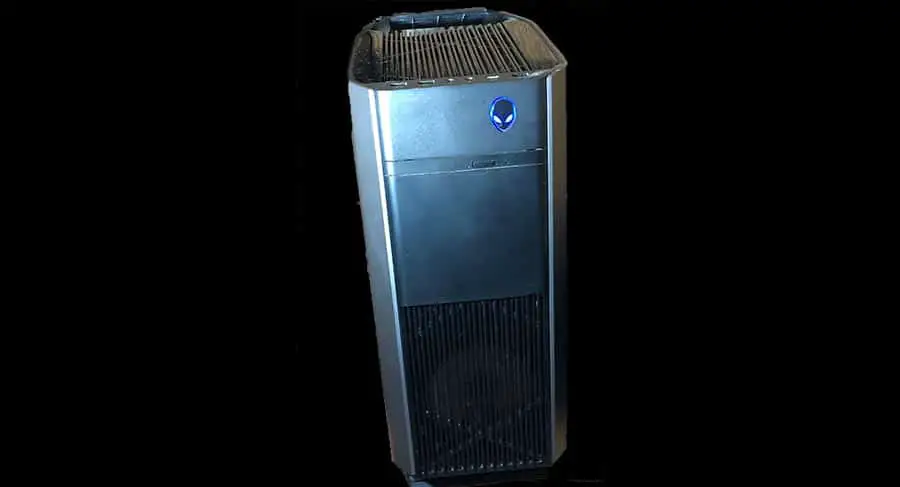
If you’re looking for a new gaming PC you’ll obviously want something that will do the job without breaking the bank. Although it comes down to how high the resolution is on the monitor you use, the types of games you play and the game settings themselves, there are still some general specifications that will meet the requirements of most games and monitors out on the market today.
To play most modern games today the recommended specs for a gaming PC are a processor with a speed of 3.5 GHZ, a dedicated graphics card with a VRAM (Video RAM) of 6 GB and 16 GB of RAM for the computer itself. A bare bones minimum system would have 8 GB RAM, 2GB VRAM, and a processor speed of 2.8 GHZ minimum.
For a PC of any type I would add a recommendation of a hard drive with a minimum capacity of 1 TB. For something that meets and exceeds all these requirements I like the Alienware Aurora R8 PC, an excellent but pricey option. I would also recommend the Dell i5680-5842BLU-PUS Inspiron Gaming Desktop as an inexpensive alternative. You can check out the price of the Alienware R8 PC desktop at Amazon by following this link, and the price of the Dell PC at this page on Amazon.
Recommended Specifications
First, here are the most important, recommended specifications for a mid-range PC.
- Processor speed of at least 3.5 GHZ with at least 6 cores
- Dedicated video card with VRAM of 6 GB
- 16 GB RAM for the PC
- At least 1 TB hard drive, it can be an SSD or mechanical hard drive. An SSD will give you a much faster boot up time and a quick start time for any applications, including games, that are installed on it. It will load cutscenes from a game much faster too
There’s more to it than that, like power supplies and wireless internet connections, but getting a PC that meets these three specification will allow you to play games like Fortnight, Overwatch, Battletech, Player Unknown and Total War: Warhammer 2 without any problems.
Processor
The heartbeat of your PC is the processor and is one of the most important things to consider. Conventional wisdom recommends a mid-range Intel Core i5 processor or equivalent. For gaming the processor clock speed is more important than anything else about the processor but unless you’re using the PC strictly for gaming you should pay attention to the number of cores as well. Six cores will still give you a well performing PC for other tasks that can even be run while gaming, like surfing the net or checking email. Stick with either an Intel or AMD processor, both are well-known brands and both perform excellently. The Alienware Aurora R8 I purchased contains a 9th generation Intel Core i7 processor with a base frequency of 3.60 GHZ that can be boosted to 4.90 GHZ. More than enough speed since it can be boosted plus it has 8 cores, giving it plenty of processing power. You can either buy or find out more about the Aurora R8 at Amazon.
VRAM
Factors that impact the need for VRAM are monitor resolution, games, and game settings you play the game at. The higher the monitor resolution the more has the more VRAM that is required. Below is a general list of how a monitor’s resolution can affect what’s needed in a video card.
- 720P resolution requires 2 GB minimum
- 1080P resolution requires 2 to 6 GB, depending on the game and game settings
- 1440p resolution requires 4 to 8 GB, depending on the game and game settings
- A 4K monitor takes 8 GB or more
The more graphics intense (detailed) the game is the more VRAM that is needed. The absolute minimum VRAM for a gaming PC is 2GB. Unlike the RAM in a PC, the VRAM is not upgradeable since its built into the card. The only way to upgrade is to buy a newer, better card and install it into the PC.
The bulleted list above should give you a general idea of what to look for in a new PC, the more demanding the game the higher the end of the memory scale you should look at. A less demanding monitor and games means less VRAM is needed. Don’t overlook the option to future proof if the cost of upgrading is reasonable in case you decide to play more graphics intense games or get a better monitor, otherwise you may need to compromise and play the games at a lower resolution setting.
Usually around 4GB VRAM is a decent choice for the majority of games and monitors, 6 GB is optimal for today’s games and monitors, and 8 GB is a great choice if you want to future-proof your system.
The video specifications are also an important consideration. As already mentioned, the spec for a mid-range PC is a VRAM of 6 GB. Obviously, the more VRAM the better (and more expensive) and the Aurora R8 I have beats this spec as well. It has an NVIDIA GeForce RTX 2080 that has 8 GB VRAM and GDDR6 memory. More than enough power to handle any game that you can throw at it. An NVIDIA RTX 2070 should perform just as well with a slower frame rate per second that will only be noticeable for the most demanding games.
I currently have two 23 inch monitors running at a resolution of 1080p and a 27 inch monitor running at 4K resolution and have absolutely no issues with any games I play or application that I run. The graphics card in my Aurora R8 is rated at 8 GB VRAM and performs excellently.
RAM
The third crucial specification is the PC RAM.
- 4 GB is simply not enough memory for today’s gaming requirements although it is adequate for older games. Good if reworking an old PC and good for browsing the web, email, and “casual” gaming, like old PC strategy games.
- 8 GB is typically the minimum recommended RAM for gaming although that may not perform well for a graphics intensive game. At 8 GB a PC will play most games with no trouble and will have no stuttering. 8 GB works well depending on the types of games you’re playing but it will limit the types of games you can play. Older games should work just fine.
- 16 GB is the best for today’s games. This amount of RAM should be good for all games except for the most graphically intense.
- 32 GB is considered the “future-proof” version, although only a few games are recommending this amount of memory.
- 64GB is overkill, mostly needed for extremely intense video editing or very large working files.
It’s a good idea to check the manufacturer’s minimum and recommended requirements for the types of games you play before buying a PC. For a mid-range PC 16 GB of RAM is recommended, anything over that is considered overkill unless future proofing. The Aurora PC I ordered meets this spec, I expect it to be at least a few more years before very many games require more than 16 GB of memory. Applications like video processing could require more but I use Adobe Premiere Pro for my video processing and have had no issues with processing any videos. Once again, if you’re interested in learning more about the Alienware PC you take a look at it on Amazon.
The graphics card in the Alienware PC I’m linking to has an RTX 2070 graphics card instead of the RTX 2080 that I have. For the price differential it’s worth considering although you can also get the RTX 2080. The most noticeable thing you will give up is in Frames Per Second of about 15%. This would not be noticeable in the strategy games I play and only the most intense FPS games will bring out any noticeable difference at all. I bought it a part of my future proofing effort and it would be a little bit of overkill if I were only buying it for strategy gaming but since I do video editing and wanted to future proof I think it was a good choice. I should not need to buy a new PC for many years to come. If you want to future proof or if you do play intense FPS games then this is a serious contender as a gaming PC.
An Inexpensive Option
A PC system meeting the minimum specifications would be good for everyday tasks like browsing the web, email, and for playing older games and even some of today’s less graphics intensive games. Strategy games like Stellaris and XCOM Chimera Squad are two examples of games that should work well but if I were in the market for even a mid-range gaming PC I would invest the money in a PC system with better specs. However, if you’re on a tight budget or just don’t want to spend a ton of money, this Dell PC at Amazon is worth looking at. The Dell i5680-5842BLU-PUS Inspiron Gaming Desktop is a good choice. Base processor speed is 2.80 GHZ but it can reach speeds of 4.00 GHZ through the Intel Max Turbo feature.
